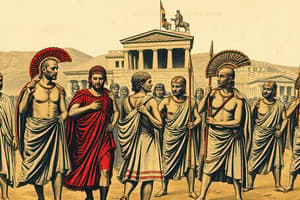Podcast
Questions and Answers
What were women in ancient Greece considered?
What were women in ancient Greece considered?
- Second-class citizens (correct)
- Equal to men
- First-class citizens
- Third-class citizens
Women were considered to be no smarter than __________.
Women were considered to be no smarter than __________.
children
Where were women expected to stay in ancient Greece?
Where were women expected to stay in ancient Greece?
home
What tasks did poor women in ancient Greece undertake outside the home?
What tasks did poor women in ancient Greece undertake outside the home?
What were wealthy women responsible for in ancient Greece?
What were wealthy women responsible for in ancient Greece?
Spartan women were able to own __________.
Spartan women were able to own __________.
Who are metics in ancient Athens?
Who are metics in ancient Athens?
What was the expectation of a Spartan mother when her child was born?
What was the expectation of a Spartan mother when her child was born?
What could happen to an Athenian girl at birth?
What could happen to an Athenian girl at birth?
Where was a newborn Athenian man's birth announced?
Where was a newborn Athenian man's birth announced?
Who were considered the lowest class of Athenians?
Who were considered the lowest class of Athenians?
What were the lower class/freedmen in ancient Athens?
What were the lower class/freedmen in ancient Athens?
What role did upper-class Athenians play in society?
What role did upper-class Athenians play in society?
Flashcards are hidden until you start studying
Study Notes
Social Class Structure in Ancient Greece
- Women were classified as second-class citizens in Ancient Greece, with limited rights and responsibilities.
- Women were often perceived as being no smarter than children, reflecting societal views on gender.
- The home was the primary domain for women, where they were expected to remain.
Varieties of Women
- Poor women had the responsibility of running errands, fetching water, and shopping, and did not own slaves.
- Wealthy women managed households and were expected to bear sons, playing a key role in family lineage.
Spartan Social Dynamics
- Spartan women enjoyed more freedoms compared to other women in Greece; they could own property.
- Spartan mothers celebrated the birth of healthy sons, emphasizing strength and resilience.
Athenian Social Dynamics
- Athenian women faced disappointment upon the birth of a girl, as some families preferred male offspring.
- The birth of a boy in an Athenian family was marked with a celebration, including pinning olive leaves to the door symbolizing success.
Ranks within Society
- Metics were non-natives who migrated to Athens for work, forming a middle-class segment.
- Slaves in Athens, captured from wars or convicted criminals, represented the lowest social class with no rights or freedoms.
Lower Classes and Freedmen
- The lower class included freedmen, former slaves who were never granted citizenship, reflecting a lack of social mobility.
Upper-Class Privileges
- Upper-class Athenians were responsible for governance, literature, philosophy, and warfare, often relying on slaves for daily tasks.
Studying That Suits You
Use AI to generate personalized quizzes and flashcards to suit your learning preferences.




